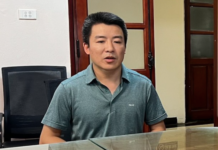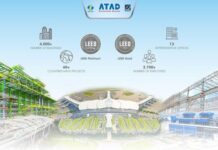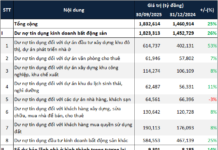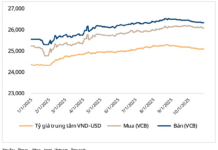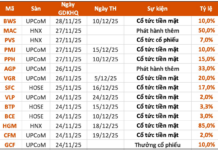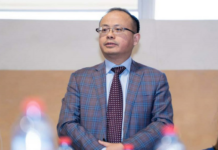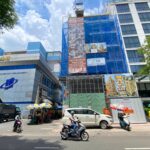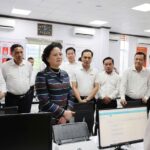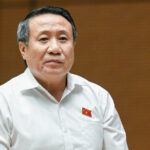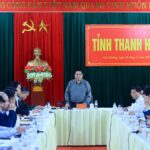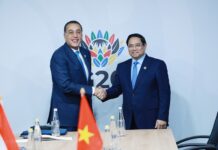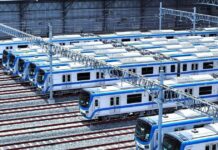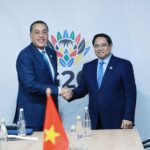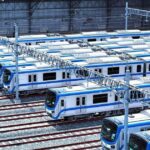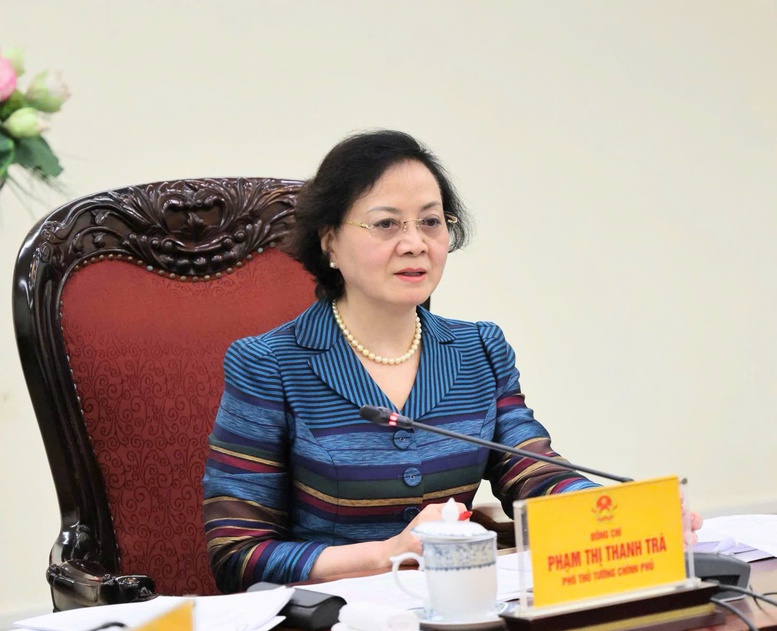
Deputy Prime Minister Pham Thi Thanh Tra – Photo: VGP
Deputy Prime Minister Pham Thi Thanh Tra, Deputy Head of the Government’s Steering Committee for the Reorganization of Administrative Units at All Levels and the Development of a Two-Tier Local Government Model, has signed Official Dispatch 171/CV-BCĐ. This document is addressed to the Chairpersons of the People’s Committees of provinces and centrally-run cities, focusing on decisively resolving challenges and obstacles at the commune level in the operation of the two-tier local government model.
In line with Conclusion No. 210-KL/TW dated November 12, 2025, issued by the 13th Central Committee of the Communist Party of Vietnam, regarding the continued development and perfection of the organizational structure of the political system in the coming period, and the directives of General Secretary To Lam at the Politburo meeting on November 14, 2025, the Government’s Steering Committee mandates that the Chairpersons of the People’s Committees of provinces and centrally-run cities prioritize and urgently address all challenges and obstacles at the commune level in the operation of the two-tier local government model. This effort should concentrate on several key areas.
Urgently Resolving Bottlenecks in Decentralization, Delegation, and Delimitation of Authority
Specifically, regarding the implementation of decentralized, delegated, and delimited functions and tasks, local authorities must continue to assess the feasibility and enforceability of laws on decentralization, delegation, and delimitation of authority at the commune level. This assessment should lead to timely adjustments, guidance within their authority, or proposals for competent authorities to amend or issue new documents that align with local realities and the requirements of the Law on the Organization of Local Governments No. 72/2025/QH15.
For tasks previously under district-level authority that have been delegated to communes in current legal documents, any challenges or difficulties should be addressed by the provincial People’s Committees. These committees must proactively and flexibly direct, manage, and clearly assign responsibilities to relevant agencies and organizations to promptly resolve issues and ensure accountability for implementation within their authority. If issues exceed their authority, they should submit proposals to the managing ministries or sectors for consideration and resolution, or report to higher authorities for handling.
Local leaders must closely and effectively oversee the implementation of decentralized, delegated, and delimited tasks, immediately addressing any bottlenecks or inadequacies. This includes comprehensively strengthening commune-level capabilities to ensure that by the end of 2025, no challenges or obstacles remain related to decentralized, delegated, or delimited tasks at the local level.
Expediting the Completion of Organizational Structures and Personnel at the Commune Level
Regarding the completion of organizational structures and the cadre, civil servant, and public employee workforce at the commune level, local Party committees and authorities must treat this as an immediate and long-term priority. They should focus on leadership and direction to resolve challenges by the end of December 2025, as instructed by General Secretary To Lam.
Urgent action is required to finalize organizational structures, reorganize, and establish new public service units at the commune level, in accordance with central policies, legal regulations, and local realities.
Continued efforts are needed to supplement and allocate sufficient specialized cadres and civil servants at the commune level. This will enhance management, operational capabilities, and service quality for citizens at the grassroots level, shifting from a passive to a proactive approach, and from management to governance and socio-economic development, while improving people’s livelihoods.
Local authorities should actively implement measures such as recruitment, transfers, rotations, or hiring under labor contracts for specialized tasks, as prescribed by law and guided by the Ministry of Home Affairs. This will ensure the addition of specialized personnel at the commune level, particularly those experienced in land management, planning, construction, finance, information technology, education management, and healthcare.
Enhancing professional training for commune-level cadres and civil servants is essential, along with exploring suitable support policies within local budget constraints for those who must relocate to new administrative centers in the initial years.
Ensuring Adequate Infrastructure and Seamless Connectivity
Regarding physical infrastructure, headquarters, and public assets, local authorities must continue to review, inventory, arrange, manage, and handle the headquarters and public assets of agencies, organizations, and units under their jurisdiction. They should also renovate and procure public assets as regulated and guided by central authorities, ensuring sufficient physical infrastructure and equipment for commune operations.
For equipment, working tools, and information technology infrastructure, the Steering Committee demands the complete resolution of shortages in equipment and working tools, particularly transmission and connectivity conditions. This includes perfecting digital infrastructure, platforms, and data to ensure seamless connectivity between local government levels. Efforts should also focus on administrative procedure reform, streamlining and simplifying internal procedures, and prioritizing digital transformation and standardized workflows. This will ensure swift, transparent, and convenient resolution of matters for citizens and businesses.
The Steering Committee directs the Chairpersons of the People’s Committees of provinces and centrally-run cities to urgently implement these measures, ensuring that by the end of December 2025, all challenges and obstacles at the commune level related to the four areas mentioned above are decisively resolved.
Deputy Prime Minister Debunks False Claims of Merging 34 Provinces into 16
Deputy Prime Minister Phạm Thị Thanh Trà has firmly stated that the social media rumors regarding the merger of “34 provinces into 16” are entirely false and baseless. She emphasized that such misinformation holds no truth and should be disregarded.
Deputy Prime Minister Pham Thi Thanh Tra Outlines 7 Key Task Groups for Lao Cai
During a working session with the leadership of Lao Cai province, Deputy Prime Minister Pham Thi Thanh Tra provided an in-depth analysis of the province’s development potential and untapped opportunities. She outlined seven key task groups to propel Lao Cai’s growth in the upcoming period, focusing on green, sustainable, and inclusive development.
Unlocking Reform Potential: Institutional Framework as the Key Focus for the 14th National Congress Draft Document
Perfecting institutional frameworks is the paramount strategic breakthrough, emphasized by National Assembly deputies, who highlight that while institutions remain the most significant bottleneck, they also present the greatest potential for reform.
Prime Minister Pham Minh Chinh Holds Working Session with Thanh Hoa Provincial Party Standing Committee
On November 9th, Prime Minister Pham Minh Chinh, alongside leaders from various ministries and sectors, visited Yen Cuong commune in Thanh Hoa province. The visit coincided with the groundbreaking ceremony for new boarding primary and secondary schools in border communes. During the trip, the Prime Minister and his delegation held a working session with the Standing Committee of the Thanh Hoa Provincial Party Committee. The meeting focused on discussing the province’s socio-economic situation, public investment disbursement, the implementation of the two-tier local government model, future directions, tasks, solutions, and addressing proposals.










